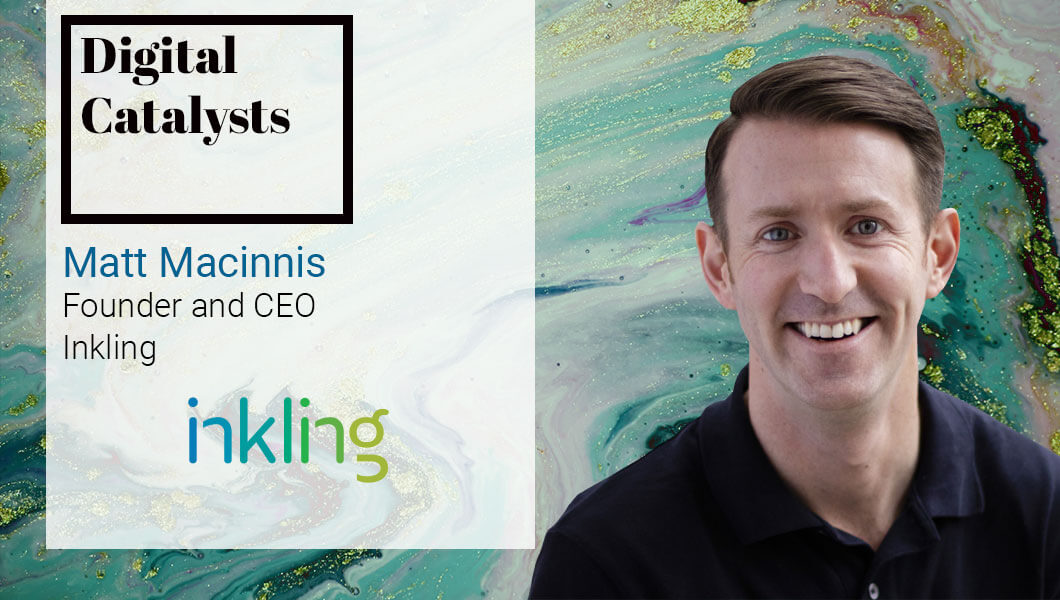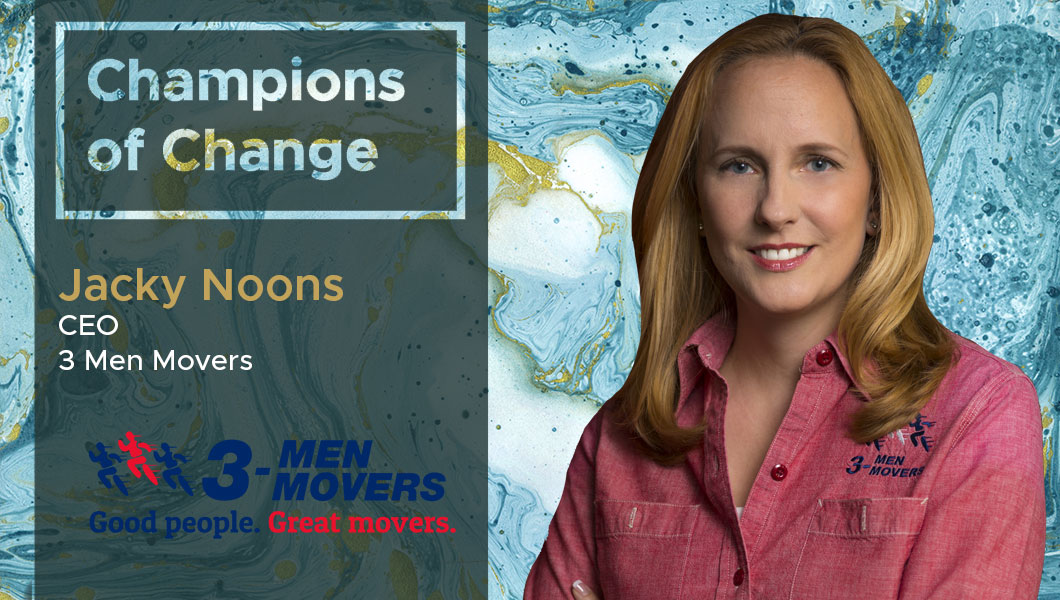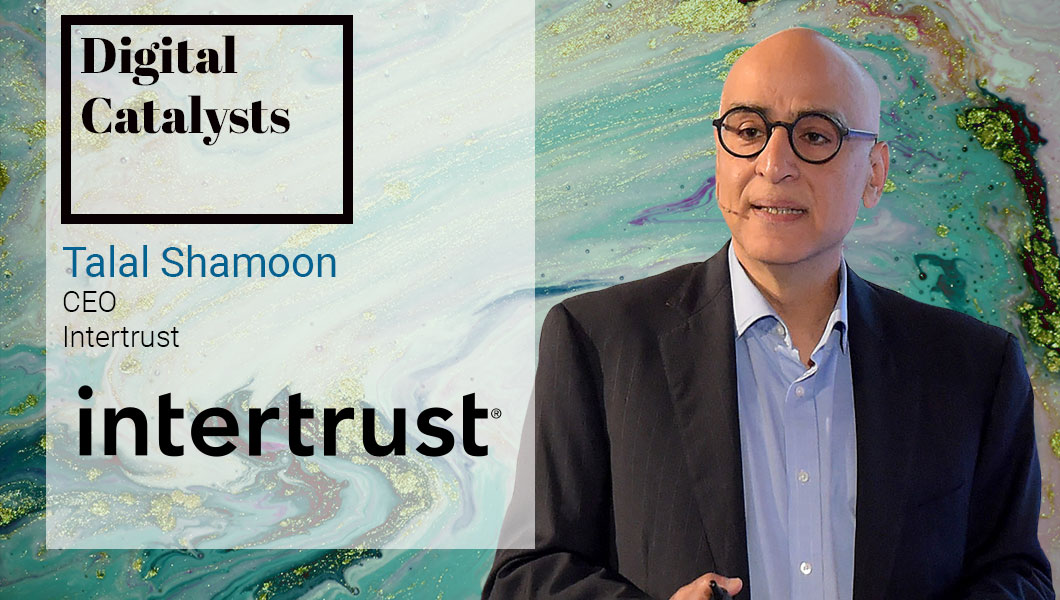Interview with Matt MacInnis, Co-founder and CEO at Inkling

In this interview, Matt MacInnis, Co-founder and CEO at Inkling discusses why firms need a paradigm change to counter the ‘anti-LMS’ feel and ensure front-line employee engagement with a mobile-first, user-friendly platform. Matt’s vision for the future of how people communicate drives Inkling’s strategy, product development and culture. He leads Inkling to make the world a smarter place. Prior to founding Inkling, Matt spent eight years at Apple, growing the use of its products in education and the sciences. He holds an Electrical and Computer Engineering degree from Harvard University
Tell us about your product/business and your specific role?
A new employee walks into a quick-service restaurant, and before he has even donned his uniform, he’s seated in front of an old PC in a windowless room for “training.” He spends hours clicking through mind-numbing screens, while the manager impatiently awaits the employee’s rubber-stamp “certification” so that he can be slotted into the short-staffed schedule. Meanwhile, the manager is digging through hundreds of emails trying to find PDFs describing a new limited time offer that starts today. He needs to figure out how to merchandise his store, arrange the workstations, and train his staff.
Both people are on the clock, paid by the hour, in effect, to waste their time. Similar scenes play out across restaurants, retail, insurance, field sales, and many other industries where the front line is crucial to the business bottom line.
Inkling is a mobile enablement platform built for the front line. It provides an easy to use solution for training, reference, task management and communications to drive efficiency, visibility, and employee satisfaction in otherwise tough and fast-paced jobs. Employees are efficiently trained at their workstation, managers get dashboards of what needs to get done, and headquarters has new visibility into the quality of field execution. It’s only now possible because businesses are finally investing in the modern information technology that front line teams need to do their everyday work.
What is the core issue your product/technology aims to address and what sets it apart from the other players in the market?
The enterprise systems that exist today for field workforces make nonsensical assumptions about the reality of end users. They assume limited access to IT, and where access exists, they assume a PC that’s primarily for the manager. Those assumptions weren’t nonsense when the products were designed, but the world has changed.
Take the classic Learning Management System, for example. It is typically used for things like compliance, training, content distribution, communications, course signups, certification, and more. And most of these use cases are shoehorned into the “course” paradigm. They have PC-centric interfaces with retrofitted mobile apps, and lack strong support for microlearning, video, search, and other things that we citizens of the 21st century have come to take for granted.
Inkling is mobile-first. It’s search-centric. It’s user friendly. It’s enterprise-scale. We like to say it’s the anti-LMS. Where the LMS was doing double duty as a content “dump,” Inkling provides a sleek, quick interface to important reference content and job aids. We reframe the problem away from “courses” and instead focus on how to help employees get their jobs done. We extend beyond the concept of learning to execution support, with tasking and communications.
It represents our vision for how learning professionals and operations professionals can work together to drive superior field performance.
What’s the one industry, sector or role that your technology is most relevant to?
We work with companies that have large front line workforces: think retailers, restaurant chains, insurance companies, airlines, hotels, and the like. Although the status quo varies broadly across industries, everyone is looking to simplify their infrastructure, modernize their workforce performance tools, and improve employee retention and engagement metrics. It is, after all, a very tough labor market at the moment.
How can enterprises engage employees (non-millennials) to move on from traditional learning methods to mobile-centric, online interactive L&D systems with SMART collaboration platforms?
The corporate mindset around training needs to change.
It’s no longer about train-test-start. It’s about start-learn-adjust. Just-in-time learning more effectively improves performance than up-front memorization. Organized, timely and targeted communications help managers, not overflowing email inboxes.
Communication and training work hand-in-hand to drive operational performance. Thus, learning and ops teams need to partner to think about the problem of field performance holistically, optimizing for the output of the system — not the individual goals of the training team or the ops team. Inkling’s software reflects this approach.
What are some of the common challenges your customers approach you with?
Most customer conversations start with “we hate our LMS.” It’s understandable: someone driving a 1995 Pontiac is a bit less satisfied with his car when the neighbors buy a new BMW. If the job to be done is front line employee enablement, then every LMS is a Pontiac.
What people mean by “we hate our LMS” usually isn’t that they want a new one. More often, they want a new approach to this job to be done.
Sure, they need compliance and certification, and a modern LMS can get that small but important part of the job done nicely. But they are more often looking to take a user-centered approach to communications, or job aids, or performance management. And who needs a “course” for that?
So while they may hate their LMS, what our customers really want is to change the paradigm for front line employee engagement and performance management. And that’s where we help people reframe the problem and move beyond the default approach.
Have there been any specific and unique requirements you have come across where enterprises have had to customize your technology to align to the L&D needs of the millennials? How can organizations ensure millennials contribute to and grow through web development programs?
The habits associated with Millennials have extended far beyond people born in the 80s and 90s. Virtually everyone relies on a mobile phone, learns from a Google search or YouTube video, and posts proud moments to Instagram or Facebook. The contrast with traditional enterprise learning systems is stark not just for a 20-something, but even a 60-something.
Inkling doesn’t need to be customized per se, but we help customers get it right. Instant login, for example, is key to driving engagement, so we want a smooth integration with the single sign-on systems of our customers. We also want the content published in Inkling to be engaging, so we work with customers to identify opportunities to incorporate video, develop shorter bite-sized elements, and optimize for search instead of long-form reading.
In the end, we help customers implement Inking to meet their security requirements while also creating a modern, seamless approach to front line enablement that actually garners usage. It’s critical to minimize the clunkiness.
Give us an example of an enterprise meeting a digital transformation goal through your product?
Whether you’re craving a burger, a taco, or a chicken sandwich, Inkling is secretly behind your satisfaction. The teams at McDonald’s, Taco Bell, and Chick-fil-A rely on Inkling to enable their teams for success, to name just three, and just one industry.
Let’s take Taco Bell. Like most companies with large labor forces, Taco Bell used PDFs on an intranet, PCs in the field, and lots (and lots) of paper to help teams learn about new limited time offers, or LTOs, which run umpteen times per year. The operations group in California, where Taco Bell is headquartered, had limited visibility into how their resources were used. What they knew for sure, however, was that their franchisees were asking for a better approach.
Taco Bell decided to make mobile training a centerpiece of the franchisee experience. Operators could, at their discretion, use tablets and phones to access the training, reference, and communications resources that would help them run their local businesses. Without forcing their hand, Taco Bell simply made it an attractive option, and most franchisees quickly followed suit. This best practice in change management — leading and guiding, rather than mandating and coercing — inevitably leads to the smoothest transition an organization can achieve.
The results were plainly positive. When new LTOs were rolled out in the Inkling test market, CSAT improved by an average of five percentage points versus the control restaurants. And in the quick-service restaurant segment, that kind of uplift is a head-turner. Needless to say, Inkling is now live for all 7,400 Taco Bell restaurants nationally. Nacho Fries, anyone?


 By
By 





